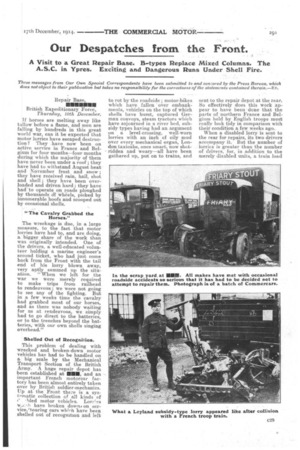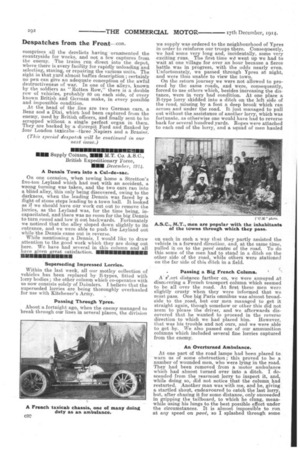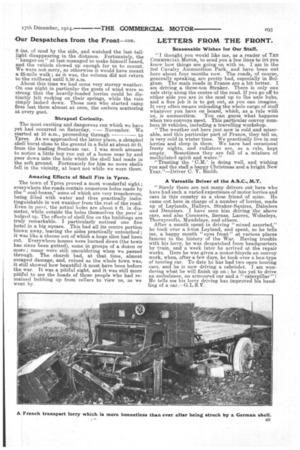Our Despatches from the Front.
Page 13

Page 14

Page 15

If you've noticed an error in this article please click here to report it so we can fix it.
A Visit to a Great Repair Base. B-types Replace Mixed Columns. The A.S.C. in Ypres. Exciting and Dangerous Runs Under Shell Fire.
These messages from Our Own Special Correspondents have been submitted to and cettLored by the Press Bureau, which does not object to their publication but takes no responsibility for the correctness of the statements contained therein.—En.
Repair Base, British Expeditionary Force, Thursday, 10th December.
If horses are melting away like tallow before a flame, and men are
falling by hundreds in this great world war, can it be expected that motor lorries have escaped destruction? They have now been on active service in France and Belgium for four months—four months during which the majority of them have never been under a roof ; they have had to withstand August heat• and November frost and snow ; they have received rain, hail, shot and shell ; they have been overloaded and driven hard; they have had to operate on roads ploughed by thousands df wheels, picked by innumerable hoofs and scooped out by occasional shells.
"The Cavalry Grabbed the Horses,"
The wreckage is due, in a large measure, to the fact that motor lorries have had to, and are doing, a bigger share of the work than was originally intended. One of the drivers, a well-educated volunteer holding a marine engineer's second ticket, who had just come back from the Front with the tail end of his lorry blown away, very aptly summed up the situation. "'When we left for the war we were merely required to make trips from railhead to rendezvous ; we were not going to see any of the fighting. But in a few weeks time the cavalry had grabbed most of our horses, and as there was nobody waiting for us at rendezvous, we simply had to go direct to the batteries, or to the trenches beyond the batteries, with our own shells singing overhead."
Shelled Out of Recognition.
This problem of dealing with wrecked and broken-down motor vehicles has had to be handled on a big scale by the Mechanical Transport Section of the British Army. A huge repair depot has been established at MEN, and an important French motorcar factory has been almost entirely taken over by British soldier-mechanics. Up at the Front there is a syst,.matic collection of all kinds of (' .bled motor vehicles. Lorr'es have broken downs on aervice,,touring cars wlorh have been shelled out of recognition and left
to rot by the roadside ; motor-bikes which have fallen over embankments, vehicles on the top of which shells have burst, captured German convoys, steam tractors which have sojourned in a river bed, subsidy types having had an argument on a level-crossing, well-worn lorries with an inch of oily mud over every mechanical organ, London taxicabs, once smart, now ridden and and weary—all have been gathered up, put on to trains, and sent to the repair depot at the rear. So effectively does this work .appear to have been done that the parts of northern France and Belgium held by English troops must really look tidy in comparison with their condition a few weeks ago.
When a disabled lorry is sent to the rear for repairs, its two drivers accompany it. But the number of lorries is greater than the number of drivers, for, in addition to the merely disabled units, a train load comprises all the derelicts having ornamented the countryside for weeks, and not a few captures from the enemy. • The trains run direct into the depot, where there is every facility for rapidly unloading and selecting, storing, or repairing the various units. The sight in that yard almost baffles description ; certainly no pen can give an adequate conception of the awful destructiveness of war'. In one of the alleys, known by the soldiers as "Rotten Row," there is a double row of vehicles, probably 80 on each side, of every known British and German make, in every possible and impossible condition.
At the head of the .line are two German cars, a Benz and a Dixi, whicn had been captured from the enemy, used by British officers, and finally sent to be scrapped without a single perfect organ in them. They are backed by a dscrepit Ford and flanked by four London taxicabs—three Napiers and a Brasier.
(This special despatcis will be continued in our next issue.) NMI Supply Colunm, 111.T. Co. A.S.O., British Expeditionary Force, 111111111 December, 1914, A Dennis Tows into a Cul-de-sac.
On one occasion, when towing home a Stretton's five-ton Leyland which had met with an accident, a wrong turning was taken, and the two cars ran into a blind alley, this only being discovered, owing to the darkness, when the leading Dennis was faced by a flight of stone steps leading to a town hall. It looked as if we should have our work cut out to remove the lorries, as the Leyland was, for the time being, incapacitated, and there was no room for the big Dennis to turn round and tow it out backwards. Fortunately we noticed that the alley sloped down slightly to its entrance, and we were able to push the Leyland out while the Dennis came out in reverse.
While mentioning a Dennis, I would like to draw attention to the good work which they are doing out here. We have had several in this column and all have given great satisfaction. ...111111111111111..1131 MONENNEMMENE Superseding Impressed Lorries.
Within the last week, all our motley collection of vehicles has been replaced by B-types, fitted with lorry bodies ; the other column which co-operates with us now consists solely of Daimlers. I believe that the superseded lorries are being thoroughly overhauled for use with Kitchener's Army.
Passing Through Ypres.
About a fortnight ago, when the enemy managed to break through our lines in several -places, the division we supply was ordered to the neighbourhood of Ypres in order to reinforce our troops there. Consequently, we had some very long and, incidentally, some very exciting runs. The first time wo went up we had to wait at one village for over an hour because a fierce battle was in progress, with the odds nearly even. -Unfortunately, we passed through Ypres at night, and were thus unable to view the town.
On the return journey we were not allowed to proceed by the same roads, and were, consequently, forced to use others which, besides increasing the distance, were in very bad condition. At one place a B-type lorry skidded into a ditch on the left side of the road, missing by a foot a deep brook which ran across and under the road. It just managed to pull out without the assistance of another lorry, which was fortunate, as otherwise one would have had to reverse back for several hundred yards. Ropes were attached to each end of the lorry, and a squad of men hauled
on each in such a way that they partly assisted the vehicle in a forward direction; and, at the same time, pulled it on to the pave centre of the road. To do this some of the men had to stand in a ditch on the other side of the road, while others were stationed on the far side of this ditch in a field.
Passing a Big French Column.
i.ort distance farther on, we were annoyed at discovering a French transport column which seemed to be all over the road. At first these men were slightly crusty when they were informed that we must pass. One big Paris omnibus was almost broadside to the road, but our men managed to get it straight again, though somehow or other this did not seem to please the driver, and we afterwards discovered that he wanted to proceed in the reverse direction to which we had placed him. However, that was his trouble and not ours, and we were able to get by. We also passed one of our ammunition columns which included several fine lorries captured from the enemy.
An Overturned Ambulance.
At one part of the road lamps had been placed to warn us of some obstruction ; this proved to be a number of wounded men, who were lying in the road. They had been removed from a motor ambulance which had almost turned over into a ditch. I descended from the rearmost lorry to inspect it, and, while doing so, did not notice that the column had restarted. Another man was with me, and he, giving a startled shout, endeavoured to catch the last lorry, but, after chasing it for some distance, only succeeded in gripping the tailboard, to which he clung, meanwhile using his lungs to the best possible effect under the circumstances. It is almost impossible to run at any speed on pave, so I splashed through some 6 ins, of mud by the side, and watched the last taillight disappearing in the distance. Fortunately, the " hanger-on " at last managed to make himself heard, and the vehicle slowed up enough for us to mount. We were not sorry, as otherwise it would have meant a 25-mile walk ; as it was, the column did not return to the railhead until 5.30 a.m.
About this time we had some very stormy weather. On one night in particular the gusts of wind were so strong that the heavily-loaded lorries could be distinctly felt rocking on their springs, while the rain simply lashed down. Those men who started camp fires lost them almost at once, the embers scattering at every gust.
Shrapnel Curiosity.
The most exciting and dangerous run which we have yet had occurred on Saturday, — November. We started at 10 a..m., proceeding through , to Ypres. As we approached the latter plane, a shrapnel shell burst close to the ground in a field at about 50 ft.. from the leading Sunbeam car. I was much amused to notice a little boy run out of a house near by and peer down into the hole which the shell had made in the soft ground. Fortunately for him no more shells fell in the vicinity, at least not while we were there.
Amazing Effects of Shell Fire in Ypres.
The town of Ypres proved a most wonderful sight ; everywhere the roads contain numerous holes made by the" coal-boxes," some of which are very treacherous, being filled with water and thus practically indistinguishable in wet weather from the rest of the road. Even in pare, the actual holes are about 8 ft. in diameter, while outside the holes themselves the pave is bulged up. The effects of shell fire on the buildings are truly remarkable. I particularly noticed one fine hotel in a big square. This had all its centre portion blown away, leaving the sides practically untouched ; it was like a cheese out of which a huge slice had been cut. Everywhere houses were burned down (the town has since been gutted), some in groups of a dozen or more ; many were still smouldering when we passed through. The church had, at that time, almost escaped damage, and, ruined as the whole town was, it still showed how beautiful it must have been before the war. It was a pitiful sight, and it was still more pitiful to see the heads of those people who had remained bobbing up from cellars to view us, as we went by.




















